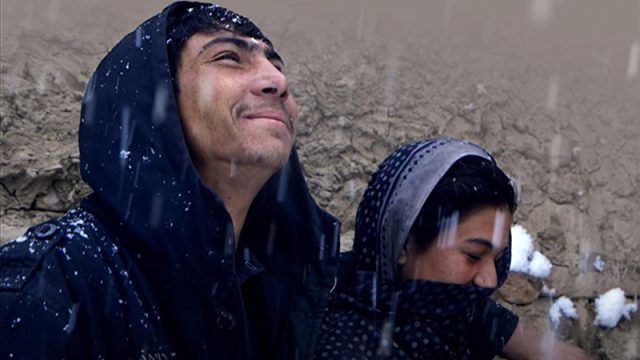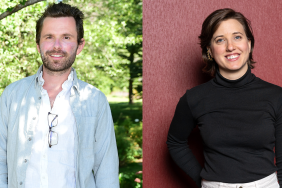ComingSoon had the opportunity to speak with editor Christoph Wermke about his work on Three Songs for Benazir, which recently earned an Academy Award nomination for Best Documentary Short. As a filmmaker, Wermke’s own shorts have won awards at the Munich Film Festival, Hamburg International Short Film Festival, and Dresden Film Festival, to name a few.
“Even as Shaista’s love for Benazir is palpable, the choices he must make to build a life with her have profound consequences,” reads the synopsis for Three Songs for Benazir.
ComingSoon’s Jeff Ames spoke with Wermke about documentary editing, getting involved with this particular documentary short, and more.
Jeff Ames: What drew you to the world of film/TV/documentary editing?
Christoph Wermke: After high school, I had to choose between going to the German army for a year or working in a social facility. With some luck I ended up working in theater doing workshops with youth groups on the plays the theater was showing. That was where I fell in love with the idea of becoming a director. I applied and was accepted to study directing at the prestigious Berlin film school DFFB (The Deutsche Film- und Fernsehakademie Berlin). Alumni include Wolfgang Petersen and Christian Petzold. In the German film school ranking of FOCUS, the DFFB — together with the Academy of Media Arts Cologne and the international film school cologne — were ranked as second after the Film Academy Baden-Wuerttemberg.
From early on I involved myself in the editing of my films and exercises. A friend asked me to edit his fictional diploma film, which took about six months, and I was paid in a more “symbolic” way. The film did very well, and I was even nominated for Best Editing at the Deutscher Kamerapreis, a major honor for any editor. By then I had started editing for almost anyone who would hire me as a way of paying my bills. When I was not editing, I worked on my own projects. In 2017 I got to edit my second feature KRIEG, which premiered at the Venice International Film Festival. The director of that film, Rick Ostermann, continues to give me the opportunity to work with exciting material and think about the story. When Rick shoots in Germany, I edit from the US and create a first cut. Then I come back to Germany to finish the film and work with him in person.
Who are some of your influences that helped inform your style and why?
When I was working in theatre, an actor who also worked in film gave me a copy of Karel Reisz’s The Technique of Film Editing. That must have been my first contact with theories on editing. Then, in film school our sound professor Frank Behnke had us watch Francis Ford Coppola’s Apocalypse Now and read Walter Murch’s classic In The Blink Of An Eye. I remember a seminar on the editing in Robert Altman’s The Long Goodbye held by Christian Petzold. Later I participated in a seminar with Bela Tarr, who likes to tell his monolithic films in very long takes. Those are some influences that met well with my own interest in simplistic style and lead me to try reducing my edits as much as possible.
How did you get involved with Three Songs for Benazir?
Anne Fabini, editor of the 2019 Oscar-nominated film Of Fathers And Sons and Independent Spirit Award-nominated film The Tale, knew me as a director/editor back in Europe. She came to LA for her award ceremonies, and I believe that’s when she got to know Elizabeth and Gulistan Mirzaei who asked her for advice on their project. She recommended I help edit the film and they reached out to me. We met, discussed the footage they had shown me and some ideas I had had, and we agreed to work together on the film. After another shooting phase in Afghanistan, when I was back in Europe and busy with other projects, Melanie Annan added new material and further shaped the film. I was invited to join Melanie Annan in advising Elizabeth and Gulistan Mirzaei on the final edit.
What was this experience like for you? And what did you learn throughout the course of the project?
In film school, I shot a documentary under the guidance of the great Austrian filmmaker, Ulrich Seidl. There I discovered the technique of working with stills, taken from all key moments in the raw footage and trying to build an arch (on paper first) before editing the actual film. I took that technique to my fictional works and now I had the chance to apply the experience I had gathered in fiction on a non-fictional project again.
Working with the directors of Three Songs for Benazir helped me better understand the similarities and differences between documentary filmmaking and fictional works. Documentary filmmaking requires an ethos different from fictional work, because in documentary filmmaking, we have to honor the truth, limiting what we are allowed to do with the footage. At one point I had built a nightmare for Shaista, combining material from Shaista in the poppy fields with shots of the military helicopters flying over the camp in Kabul. I was trying to illustrate Shaista’s fear of being killed either by the Taliban or the American soldiers. Looking at the scene I built, it became clear that using the footage this way was treating it as if it was fictional, so we had to find other ways to tell the story.
What challenges did Three Songs for Benazir present to you?
I think the biggest challenge was finding ways to combine material that was shot over several years into a film that is only 22 minutes long. We had to build enough interest in Shasta and Benazir so that the audience would be willing to bridge the gaps that the told time would demand from us.
How did you ultimately settle on a style for this project? (Were you given specific direction, or free to try different approaches?)
In my view, the final style has grown out of the combined efforts of Melanie Annan and my work with the directors. In my time with the project, we built a tight arch up to the point when Shaista and Benazir left for the poppy fields. Then the directors went and shot again when I was in Europe. Melanie Annan joined the project and added the last chapter (Shaista in the rehab clinic), but she also went back and added more detail into my work. That loosened the arch a bit but also brought back poetic moments that I left out in the first phase of editing.
What were some of the things you learned from this project that you’re excited to apply to future endeavors?
Women and men from around the globe coming together to work on a common vision. I’d love to have more of that. Elizabeth Mirzaei is an American who lives in Afghanistan and Gulistan was born in Afghanistan but lived in Iran for a long time. The producer, Omar Mallick was born and raised in London. The composer, Qais Essar, is Afghan American. Mel Annan was born in Australia and I was born in East Germany.
What was your reaction to your Oscar nomination?
I’m in Europe right now and the headlines are saying “War in Ukraine next Wednesday!” I’m flabbergasted that there is no one in the streets demanding peace.
Three Songs for Benazir shows us people have to pay the price for others’ decisions. I hope the nomination will help a broader audience see and remember that.
Do you have any other projects coming up that you can share with us?
I’m here in Europe working alongside the great Rick Ostermann (who brought me to the Venice International Film Festival and later directed the second season of Das Boot). We are editing the German season of a Europe-wide project that will come out in the fall. That is all I can share right now.
Additional comments?
Thinking of Shaista and Benazir living in Afghanistan these days, I’m afraid for them. They never made a lot of money to begin with, and right now a horrible number of Afghans are left to starve. I’m worried for Shaista but even more for Benazir and the kids. Now that America has left the battlefields, I hope we don’t turn away from the people left behind.










